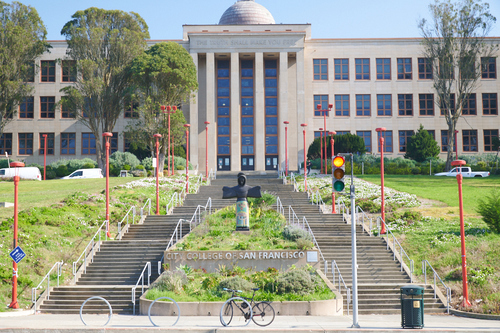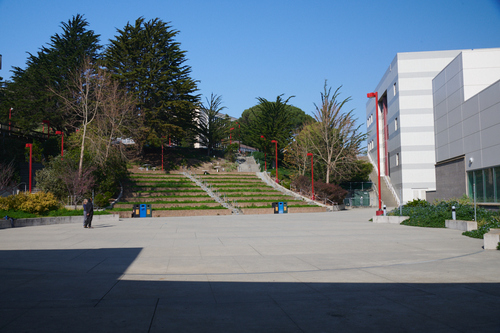Instructors Work around the Unpredictability of a Partially Reopened Campus
By Emily Margaretten
Despite a shaky start to the spring semester, City College faculty were committed to delivering in-person instruction, coming up with innovative solutions to mitigate the unpredictability of a partially reopened campus.
Chancellor David Martin presented a return-to-campus update at the Board of Trustees meeting on Jan. 27, stating that approximately 30% of teaching sections were scheduled to meet in-person.
Many of these classes however pivoted to a hybrid model during the first few weeks of the semester because of the Omicron surge
The chancellor’s update described the safety protocols that were being used to lessen the risks of COVID-19. “In-person sections are following social distancing protocols and student vaccination records and/or proof [of negative COVID-19 status] are being verified at the entrance to the facility,” he said.

Andrew Segala/The Guardsman
Health Monitors
While the chancellor’s report stated that the checking of campus passes was part of the college’s reopening plans, the logistics of who should inspect these passes was less clear. The administration said it would assign monitors at building entrances in an agreement with AFT 2121, but in practice this has not been implemented consistently.
Computer Science Instructor Craig Persiko said that staff from Admissions and Records performed this function during the first two weeks of the semester when registration was occurring on campus. Since then, he has continued to do it, a scenario that many other faculty have encountered as well.
Dance Instructor Jeanette Jing Male described the process. “We’re still waiting to be staffed with a door monitor to our building [the Wellness Center]. So, the faculty kind of have to wear two hats at once,” she said.
“You know, we’ll wait by the locked doors in the buildings to let our students in,” Male continued. “We make sure that all the health screenings are taken care of, and then we usher them down the hallway into the proper rooms.”
“It’s kind of tedious,” she added.
Getting into buildings to teach classes and use their offices presented another challenge for faculty. Unlike many other campuses, City College is not equipped with electronic entry cards. It uses keys that need to be cut and distributed.
Most faculty have not received keys to buildings and need to ask deans or other staff members to open doors for them. Access to buildings is especially difficult when fewer classes are running and less people are on campus.

Skeleton Crew
Fewer people on campus also means that maintenance issues are more difficult to resolve because less people notice them, report them, and are around to fix them.
Art Instructor Nancy Elliot described the situation of teaching in a classroom with heating problems. When one of her colleagues plugged in a portable heater, it blew a fuse.
“Being the only faculty there, she had to call retired faculty and say, ‘Can you help me out in this situation? Where’s the fuse box? What’s going on?’ There’s just a lack of that kind of support because there’s not a lot of us on campus teaching right now,” Elliot said.
Support services for students, like access to the library and in-person tutoring, have been limited as well. Math instructor Sonny Mohammadzadeh summed up his impression of the college’s reopening by using a report card analogy.
“Being with my students is an A plus, awesome,” he said. “The access to buildings is a D. And then student services is an F. No student services whatsoever.”
Mohammadzadeh and his colleagues wrote a letter to the chancellor and board of trustees in November asking for clarity about campus reopening plans. They also requested that the administration scale up services for students and faculty to improve learning and teaching conditions.
Mohammadzadeh described the response they received from the chancellor and trustees as “boilerplate.” He said they replied that they would be working with the appropriate people to get these things going.
While short on details, the chancellor’s return-to-campus update outlined an intent to reopen shared study spaces and access to the library and student union this semester. It also mentioned improved food options on campus that, until recently, was limited to the bookstore.
This includes the reopening of the Lunch Box and Cafeteria. The Lunch Box will be open 7:00 a.m. to 1:00 p.m. Monday through Friday, and the Cafeteria will serve lunch Tuesdays, Wednesdays, and Thursdays from 11:30 a.m. to 1:30 p.m.
The Culinary and Management School also plans to provide food options with its student-run quick serve program. Instructor Vince Paratore said this year’s theme is “Chickens that Eat Pizza” and will feature roasted chicken with sides, homemade pizza, salads, and specialty beverages. It will be open Tuesdays and Thursdays from 11:30 a.m. to 1:30 p.m starting Feb. 15.
